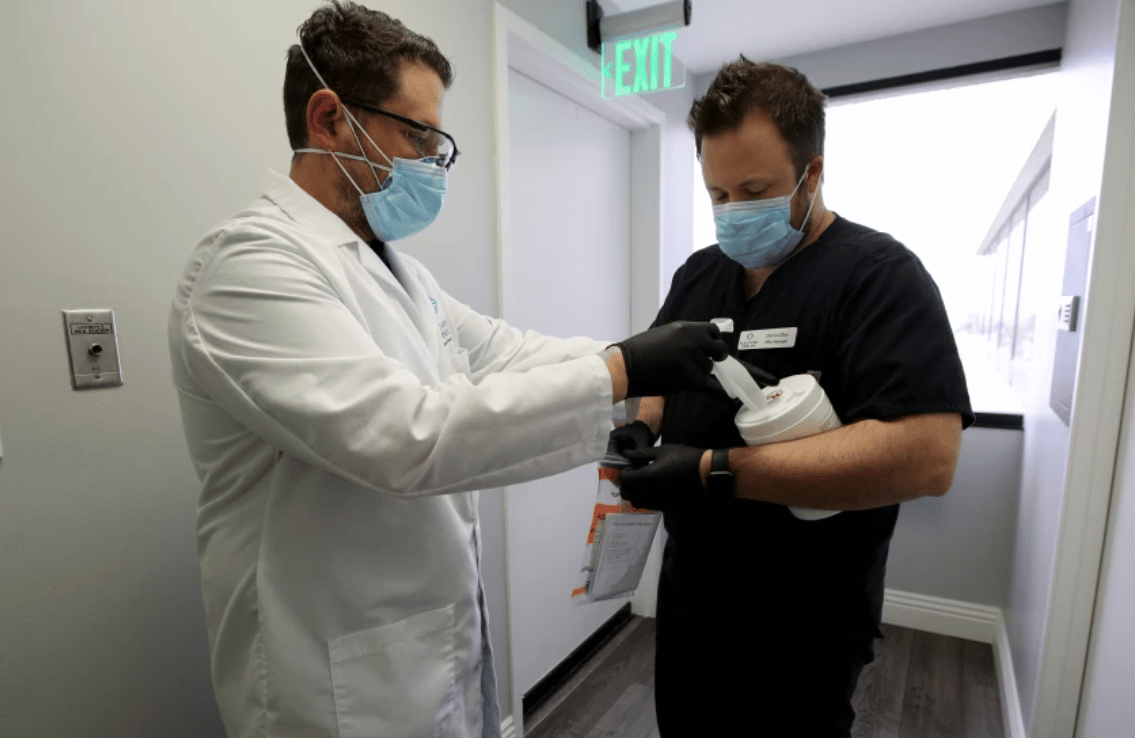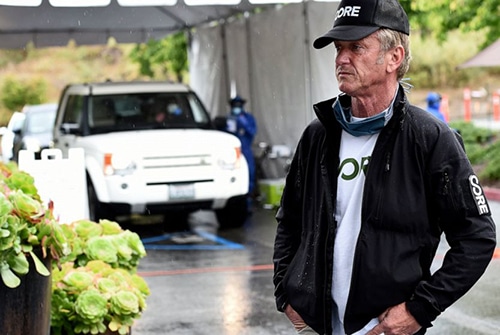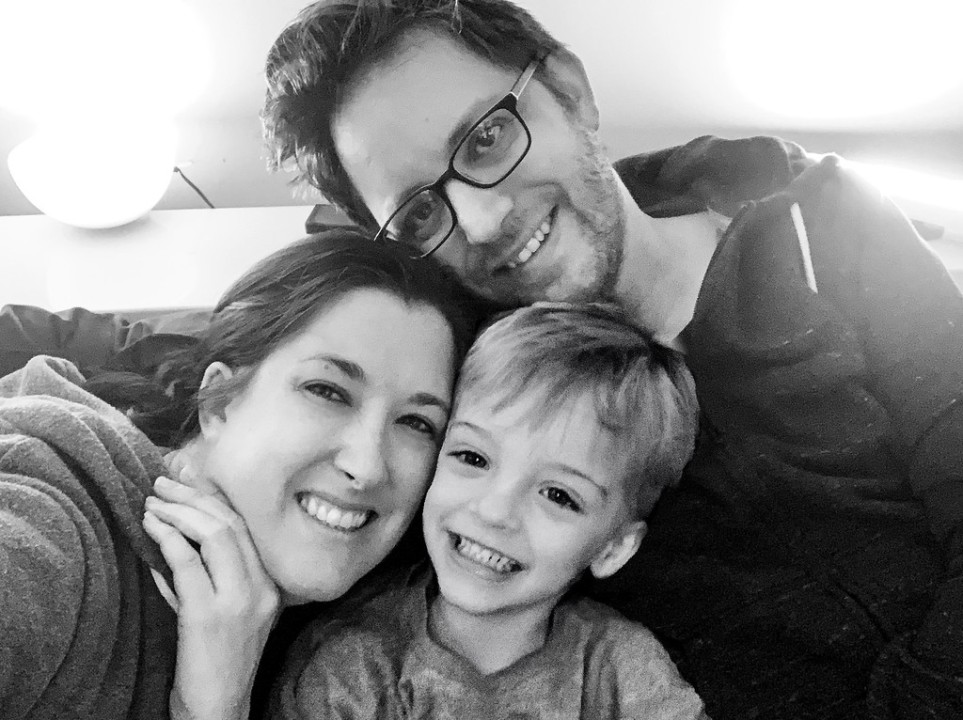Gloved, goggled and masked, Dr. Matthew Abinante walks out of an emergency exit with a medical assistant holding the door. The physician steps up to whatever car is idling and asks the driver to roll down the window enough for his or her arm to fit.
“Look straight ahead,” Abinante says, guiding a swab into the patient’s nostril. “Don’t cough.”
A few seconds later, he seals the swab in a biohazard bag. And it’s over. Within two or three days, the patient will know whether he or she has the coronavirus that causes COVID-19.
Abinante, 36, was midway through another day of drive-up testing near his Huntington Beach office’s loading dock, eight floors down from where he runs a small private practice in a medical tower off Beach Boulevard.
As an early adopter of drive-up testing in Southern California, he has faced skepticism and a lack of supplies, though he has an abundance of intrinsic motivation.
“I’m a huge advocate for my patients,” he said. “I will do anything for them.”
As the coronavirus crisis tightened its grip on the United States this month, Abinante started reaching out to his lab partners to piece together a stock of testing kits. On March 11 he got his first two kits from Quest Diagnostics. The next day, he got eight. The day after, 10. On Thursday, he got a batch of 50, sent overnight from HealthTrack RX in Georgia, sealed in a nondescript box. He lucked out, he admitted.
By Wednesday, he had completed about 40 tests, received eight results and identified one positive. On Thursday, he expected to test into the night.
Tests are by appointment only at (714) 916-5210. They start at about $200, and patients do not need to have insurance or be an existing patient at Abinante’s office.
Personal protective equipment has been harder to come by. Without disposable gowns, Abinante strips off his white coat after every patient. He has about half a dozen coats, which he washes in his office’s compact combination washer-dryer.
He uses the same N95 mask all day, with a fresh surgical mask atop it for every encounter. Before his Thursday surge he met with a Craigslist seller who brought 10 to his lobby in a box that suggested they had been sold at a hardware store. It was $70 for the box. The seller was skittish.
Abinante said he suspected he was a scalper, but he wasn’t going to report him because he needed the masks.
“It’s not sealed. That’s kinda scary,” he said. “I guess I trust this guy.”
TESTS KITS
On Thursday, Abinante’s landlord, also a physician, commanded him to stop. The building also serves elective and cosmetic surgical patients, and the landlord considered the on-site tests risky.
The two had a heated argument as a just-swabbed patient in a white SUV backed out. The landlord, who declined to give his name, threatened to call police.
He cooled off and said Abinante could continue testing as long as the specimens didn’t enter the building, so the doctor gathered them in bags at the driveway.
In tightly scheduled 15-minute blocks, patients from Los Angeles to Irvine have pulled in, texted him to say they’re outside, and the brisk ballet ends almost as quickly as it begins. Open door. Open window. Insert swab. Twist. Count a few seconds. Drop swab in bag. End.
Abinante acknowledges the tests are awkward and clipped. There’s no time for good bedside manner.
He said he roughly follows the same screening guidelines as public health agencies — does the person have symptoms; has he or she traveled to coronavirus hot spots or had contact with known patients? But he will be a little looser.
So far, Stacey Cochrane is Abinante’s only confirmed case.
Cochrane, 40, is a photographer in Playa del Rey. Her husband had flu-like symptoms last week — chills, sweats, a fever of 101, severe body aches and chest tightness. Two days later, so did she.
“It just felt like a heaviness in our chests that would not go away,” Cochrane said. It was all the more distressing because her husband, Andy, is asthmatic.
Another of her symptoms was a loss of smell or taste, despite no postnasal drip or congestion.
Cochrane’s usual doctor said he would not be able to test her and told her to stay home unless she went into respiratory distress. She found out about Abinante through a friend and drove down Friday for her test.
When Cochrane’s results came in Monday, she “was kind of freaked out.” She still is. But her fever has broken, and Abinante tells her it should be a mild case.
She and Abinante assume her husband also has COVID-19, but he only tested her because her case was fresher. They’re not sure how he would have been exposed.
Her son Conor, 3, has not shown any symptoms and has been on lockdown with them. Even the dog hasn’t gone for a walk.
“We have really not opened our door for eight, nine days now,” other than to get tested, Cochrane said. Friends have dropped provisions at their door, including frozen waffles, a must-have for Conor.
They expect to spend another week cooped up and then some, just to be cautious.
Cochrane said she’s had worse colds but understands the fear and the gravity of the global crisis. She also wants people to know that while it’s unpleasant, not every case is dire.
“I don’t feel lucky that I got it,” she said. “Absolutely I feel lucky that if this is the worst of it, that’s what we got.”
Marcos Padilla, 37, drove his blue Chevrolet to Abinante’s office from his Anaheim home Thursday at the request of his boss and family.
The civil engineer, who just returned from a long-planned personal trip to London and Amsterdam, says he has no symptoms of the disease, but he shares a home with his wife, two young sons and his 79-year-old mother, who has osteoporosis.
He said he’s not nervous, but information about the illness “changes every day, every hour.” Padilla is expected to know his test results by Saturday.



